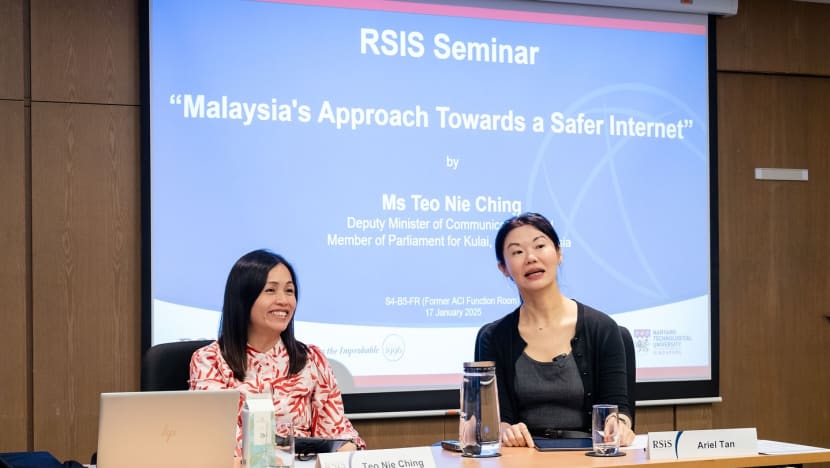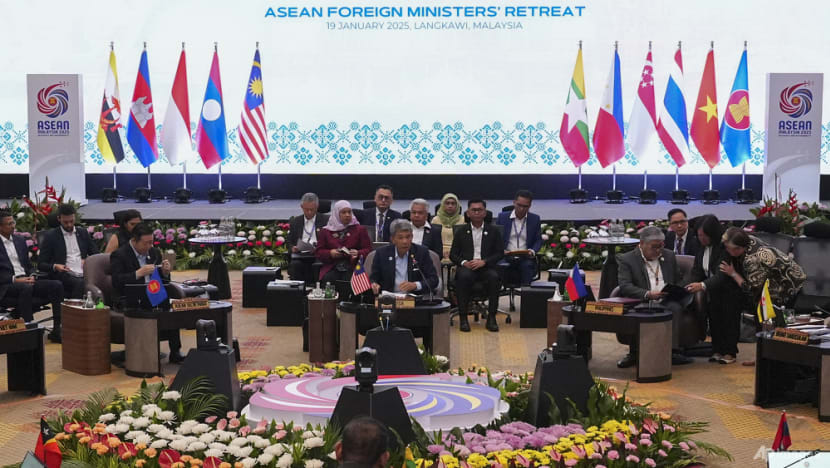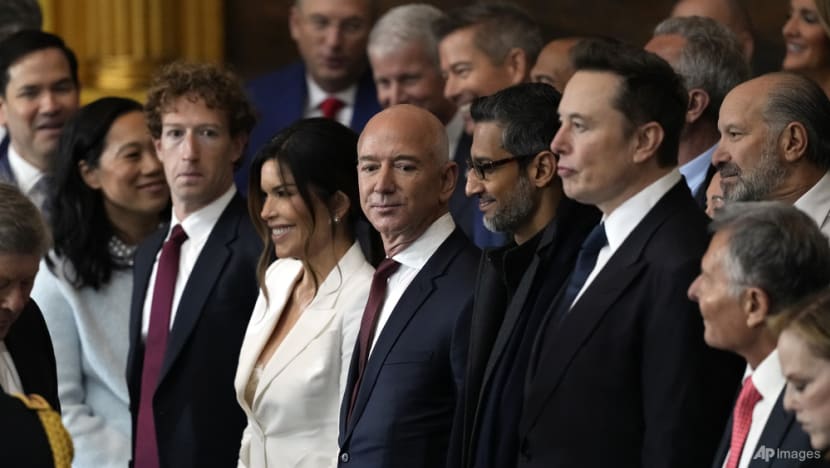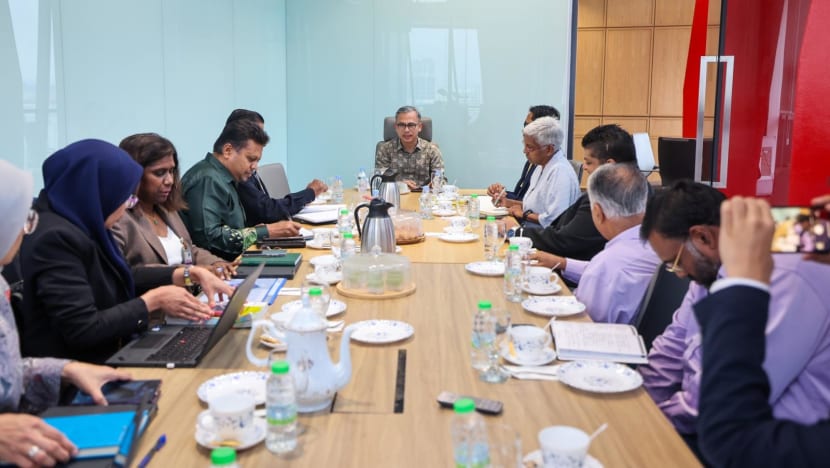analysis Asia
Malaysia’s bid to rally ASEAN in taking on Big Tech - good shot or 'insurmountable challenge'?
Malaysia wants ASEAN to build collective power in negotiating regulations with social media platforms, but analysts say resistance from member states and Big Tech might prove too much.

Malaysia Deputy Communications Minister Teo Nie Ching (left) speaking at a seminar held at the S Rajaratnam School of International Studies in Singapore on Jan 17, 2025. (Photo: Facebook/Teo Nie Ching (张念群))

This audio is generated by an AI tool.
KUALA LUMPUR: Malaysia’s “ambitious” plan to “unify” ASEAN countries’ internet laws to achieve greater bargaining power with Big Tech could run into several roadblocks, say analysts.
The country aims to use its position as chair of the Association of Southeast Asian Nations (ASEAN) this year to unify the 10 member states’ tech legal frameworks, for better leverage in regulating social media platforms against harmful online content, said a Malaysian minister last week.
But analysts told CNA that while ASEAN countries face similar issues such as the spread of hate speech and misinformation on such platforms, these countries vary widely in their internet laws, politics, cultures and digital maturity.
"ASEAN has no legislative powers as an inter-governmental organisation and the member states’ legal systems, levels of maturity and effectiveness differ widely amongst each other," said Kristina Fong, lead researcher of ASEAN economic affairs at Singapore’s ISEAS-Yusof Ishak Institute.
"As such, even with the best intentions, it would be an insurmountable challenge to successfully unify these systems."
Big Tech is also likely to avoid negotiating such regulations with ASEAN as a bloc, given their "divide and conquer" approach to preserving profits and the money they have put into complying with laws in individual jurisdictions, the analysts said.
At a seminar on Malaysia’s efforts to make the internet safer last Friday (Jan 17), Malaysia’s Deputy Communications Minister Teo Nie Ching said a “key agenda” for her country’s ASEAN chairmanship is to engage the bloc and “unify” member states’ legal frameworks on internet regulation.
“And of course, we use it to actually negotiate with the platform provider. We believe that that can be more powerful,” she said at the seminar held at the S Rajaratnam School of International Studies (RSIS) in Singapore.
While Teo noted Malaysia’s efforts to make platforms more accountable for online safety through its licensing requirement for all social media and internet messaging platforms with at least eight million registered users in the country, she believes “many more challenges” lie ahead.
“We are only a 34 million population, and it will be difficult for smaller countries to actually engage with the tech giants,” she added.
“But if ASEAN is able to act as a bloc, then we believe that our negotiation power will be much, much larger.”
Her comments came just a few weeks after Malaysia officially assumed the ASEAN chairmanship on Jan 1.
ASEAN comprises Brunei, Cambodia, Indonesia, Laos, Malaysia, Myanmar, the Philippines, Singapore, Thailand and Vietnam.
Last August, in an interview with Malaysian news agency Bernama, Teo had urged ASEAN countries to unite in an effort to strengthen their negotiating power with social media giants and effectively combat the growing problem of online crime in the region.
While Teo had then hoped this issue would be on the “main agenda” at last year’s ASEAN Summit under the chairmanship of Laos, the chairman’s statement released on Oct 9 touched on online job scams and cybercrime but made no mention of social media platforms.
In recent months, Malaysia has embarked on a growing push to regulate Big Tech, starting with its class licensing requirement that kicked in on Jan 1.
It has also passed harsher penalties and wider powers in amending its Communications and Multimedia Act, attracting backlash from civil society groups, and has introduced an Online Safety Act that critics fear could further empower the suppression of online content.
HOW MIGHT MALAYSIA GO ABOUT DOING IT?
Malaysia’s renewed effort to unite ASEAN members’ legal frameworks against Big Tech is “very ambitious, although not impossible”, said Shafizan Mohamed, an associate professor of communications at the International Islamic University Malaysia.
“I think as the ASEAN chair, it's a good opportunity for Malaysia to take this lead, to create a momentum for a regional approach against Big Tech,” she told CNA.
Benjamin Loh, a senior lecturer in media and communication at Taylor’s University, said Malaysia has a “good shot” at succeeding in its efforts.
“While ASEAN often struggles to find common ground due to differences in governing styles and ideologies, there appears to be growing authoritarianism across the region which sees social media as a common threat,” he told CNA.

Despite that, Shafizan said Malaysia needs to do “a lot more work” to achieve a unified ASEAN legal framework on Big Tech, suggesting a “phased and strategic” approach that member states can agree with.
“Maybe start by having voluntary guidelines or an original code of conduct to be shared by all members,” she added.
A “tangible and realistic” starting point, Fong said, would be to prioritise initiatives for a safer online environment across ASEAN member states and have some baseline safeguards in place for cybersecurity, personal data protection and cross-border transfers.
But given ASEAN's emphasis on consensus-building, another observer told CNA it is unlikely the outcome will be something that is binding for all member states.
“At best, we may see a set of guidelines,” said RSIS research fellow Manoj Harjani, an expert in the regulation of critical and emerging technologies.
“This is still a useful outcome, but it will not necessarily lead to ASEAN member states collectively acquiring more negotiating power relative to Big Tech companies.”
DIFFERENT APPROACHES ASEAN’S “BIGGEST STUMBLING BLOCK”
According to Harjani, Malaysia’s “biggest challenge” is the wide variation in ASEAN member states’ attitudes towards and expectations of Big Tech, which depend on their level of economic development and digitalisation, as well as their strategies for growing their digital economy and managing the information environment.
“It is impractical to expect every ASEAN member state to have the same needs when it comes to regulating Big Tech,” he said.
The “biggest stumbling block” to a unified ASEAN legal framework, Loh said, is its member states’ “vastly different” approaches to media regulation.
He added that while Malaysia has mandated class licensing for social media platforms, this is “nowhere near” as extensive as the European Union’s (EU) Digital Services Act, which he believes is seen as a “huge inconvenience” by Big Tech.
The Digital Services Act, which applies to online intermediaries offering services in the EU regardless of whether they are established in the EU or outside, has compelled social media platforms to take steps to prevent illegal and harmful online activities as well as the spread of disinformation.
“You must understand that the EU countries are more cohesive politically, economically, culturally, and also the nations have almost equal levels of digital maturity,” Shafizan said.
“So, they are able to agree on a standardised legal framework. When they have that, they have that collective power to regulate and compel compliance from Big Tech. We have seen how Meta and Google have adjusted their policies in Europe to avoid penalties.”
But unlike EU countries, ASEAN member states have “very diverse” politics, economies, cultures and digital maturity, Shafizan said.
“Another thing is that ASEAN members are mostly post-colonial states, and they are very concerned about their autonomy. So there might be resistance from member states who are worried about losing their regulatory autonomy,” she added.
“Some (ASEAN) countries are still quite dependent on Big Tech, so they need to find that balance between their own national interest and the need for collective regional goals.”
For instance, Shafizan pointed to how the Philippines and Vietnam are still developing their economies, with Big Tech and digital technologies providing “tremendous opportunities” for people’s livelihoods in areas like the gig economy.
NO ONE-SIZE-FITS-ALL FRAMEWORK
Fong highlighted that negotiations with Big Tech on regulatory issues have largely been handled on an individual country basis.
She cited how social media platforms showed “initial resistance” to Malaysia’s class licensing regime, but productive discussions between the tech companies and the government led to a better understanding and agreement on the purpose and need for the licence.
“As such, due to these sensitivities from a business perspective and salient characteristics of individual sovereign states in terms of the digital environment as well as legal and regulatory frameworks, it may be more effective to have these dialogues on a country-specific basis rather than bloc-wide,” Fong said.
Loh added that social media companies are likely to be “antagonistic to any moves” by ASEAN that seek to increase content moderation, based on Meta's recent change in policy on content moderation vis-a-vis fact-checking removal.

A unified ASEAN stance on Big Tech will also make it harder for these companies to adopt a “divide and conquer” approach to regulation, Shafizan said.
“Because we all know Big Tech companies are profit-driven and sensitive to market access, they will definitely be more likely to comply when they are faced with a collective market of over 650 million users,” she said.
“This is, I think, the advantage that ASEAN must leverage on. Because we are bigger than even the European Union.”
Teo said at the seminar that the Malaysian Communications and Multimedia Commission has held conferences with ASEAN internet regulators, together with representatives from agencies in Australia and the United Kingdom, to “prepare the ground” on unifying legal standards.

Still, Harjani said Big Tech companies would prefer to negotiate with individual countries as negotiating with ASEAN collectively might not provide regulatory clarity and predictability in terms of operations and the cost of doing business.
“Another factor is that these companies have already invested in a compliance infrastructure that addresses the legal complexities in each jurisdiction they operate within - there would be little incentive to overhaul that to force the issue of having a unified region-wide regulatory framework,” he said.
While Malaysia can study examples in the EU and ASEAN dialogue partner countries, Harjani cautioned there is no one-size-fits-all framework for regulating Big Tech.
For example, he said a single framework would not be able to address both the social impact of these companies’ services and how their dominant market positions have transformed competition with other players in certain sectors.
"The reality is that no country or regional organisation has truly figured out how best to regulate Big Tech companies, and we are dealing with a moving target anyway because there is no universal idea regarding what successful regulation of Big Tech looks like and how that can be measured,” Harjani added.
Additional reporting by Izzah Aqilah Norman




















